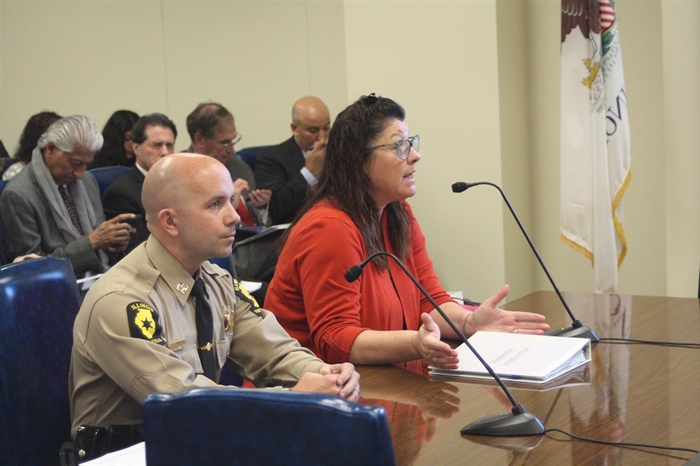SPRINGFIELD – Officials at the Illinois State Police said Tuesday they are working to finalize rules for registering assault weapons and other items that are now tightly regulated under the state’s new assault weapons ban as a Jan. 1 compliance deadline approaches.
ISP attorney Suzanne Bond told the Joint Committee on Administrative Rules, a bipartisan panel that oversees administrative rulemaking, that the agency just completed another round of public hearings this week and is now in the process of trying to answer all the questions it received from the public.
“They were well-attended by the public and various organizations,” she said of the hearings. “Those groups have committed to sending us their questions in writing. To the extent possible, if we had answers, we did provide them. We pointed them to relevant FAQs on our website, which have been updated.”
The registration requirement is part of the state’s new assault weapons ban, known as the Protect Illinois Communities Act, which lawmakers passed in January. It bans the sale, purchase, possession, and distribution of a long list of firearms defined as “assault weapons” as well as various firearm attachments, large-capacity magazines, and certain kinds of ammunition.
Read more: Assault weapon registration period remains open as Illinois State Police seeks further input
The law also states that people who owned those items before it took effect are allowed to keep them, as long as they register them with the Illinois State Police before Jan. 1.
As that deadline approaches, however, ISP is still in the process of finalizing administrative rules that will spell out exactly what items must be registered.
In September, ISP published temporary rules spelling out a registration process, and the agency began accepting online registrations Oct. 1. But many people have complained that those rules are not clear and that it’s difficult to tell what items must be registered and what items are exempt.
Read more: Assault weapon registration period remains open as Illinois State Police seeks further input
Interested parties have until Nov. 20 to submit written comments on the proposed rules. The email address for submitting those comments is ISP.Legal.PublicComments@illinois.gov.
As of Tuesday, according to ISP statistics, 2,906 individuals had submitted registrations under the temporary rules. Those registrations covered 5,450 firearms, 2,871 accessories, and 58 sets of ammunition.
Still others have said they believe the requirement is unconstitutional and they don’t believe most gun owners will comply with it.
“Hundreds of thousands of people will absolutely not comply,” state Rep. Brad Halbrook, R-Shelbyville, said at a hearing in Springfield Nov. 2. “It is up to the governor and the legislature to truly decide if they’re prepared to declare war on law abiding gun owners or not.”
JCAR cochair Sen. Bill Cunningham, D-Chicago, told reporters after the meeting that he understands some of the technical confusion over which items must be registered, but he said the law gives ISP authority to adapt its rules as time goes on.
“The existing statute does contemplate the state police dealing with this problem and allows them to amend rules on an ongoing basis. They have that authority in the statute,” he said. “So I think that problem was anticipated. And that’s how the law intends to deal with that problem.”
Meanwhile, the Protect Illinois Communities Act remains under legal challenge in federal court. On Friday, a federal appeals court in Chicago decided on a 2-1 vote not to issue an injunction blocking enforcement of the law, saying the plaintiffs who challenged it had not shown that they are likely to prevail in a constitutional challenge.
Read more: Federal appeals court upholds Illinois’ assault weapons ban
Two of the plaintiffs in that case, the Illinois State Rifle Association and the National Association for Gun Rights, have said they plan to appeal to the U.S. Supreme Court, which has been reluctant in recent years to approve of firearms regulations.
Read more: Gun rights groups to seek Supreme Court ruling on assault weapons
But Cunningham said the legal challenges won’t prevent the state from moving forward to implement the law, at least for now.
“We have a saying that every law is constitutional until a court tells you it’s not,” he said. “So the State Police has to go along with the rulemaking as contemplated by the law.”

